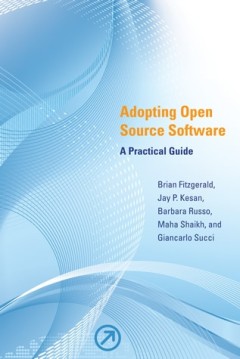Filter by

Adopting open source software : A practical guide
A rich case-study analysis of open source software adoption by public organizations in different countries and settings. Government agencies and public organizations often consider adopting open source software (OSS) for reasons of transparency, cost, citizen access, and greater efficiency in communication and delivering services. Adopting Open Source Software offers five richly detailed rea…
- Edition
- -
- ISBN/ISSN
- 9780262298261
- Collation
- 1 online resource (187)
- Series Title
- -
- Call Number
- -

Perspectives on free and open source software
What is the status of the Free and Open Source Software (F/OSS) revolution? Has the creation of software that can be freely used, modified, and redistributed transformed industry and society, as some predicted, or is this transformation still a work in progress? Perspectives on Free and Open Source Software brings together leading analysts and researchers to address this question, examining spe…
- Edition
- -
- ISBN/ISSN
- 9780262256124
- Collation
- 1 online resource (xxxi, 538 pages) :illustrations
- Series Title
- -
- Call Number
- -

For fun and profit :a history of the free and open source software revolution
The free and open source software movement, from its origins in hacker culture, through the development of GNU and Linux, to its commercial use today.In the 1980s, there was a revolution with far-reaching consequences--a revolution to restore software freedom. In the early 1980s, after decades of making source code available with programs, most programmers ceased sharing code freely. A band of …
- Edition
- -
- ISBN/ISSN
- 9780262341172
- Collation
- 1 online resource.
- Series Title
- -
- Call Number
- -

Critical perspectives on open development :empirical interrogation of theory …
"Explores whether, for whom, and under what circumstances the free, networked, public sharing of ICT resources contributes to positive social change"--OCLC-licensed vendor bibliographic record.
- Edition
- -
- ISBN/ISSN
- 9780262363327
- Collation
- 1 online resource.
- Series Title
- -
- Call Number
- -

Internet success :a study of open-source software commons
Drawing on literature from many disciplines and using a theoretical framework developed for the study of environmental commons, Schweik and English examine stages of open-source software (OSS) development, presenting multivariate statistical models of success and abandonment.OCLC-licensed vendor bibliographic record.
- Edition
- -
- ISBN/ISSN
- 9780262301206
- Collation
- 1 online resource (xii, 351 pages) :illustrations
- Series Title
- -
- Call Number
- -

The comingled code :open source and economic development
In this book, Josh Lerner and Mark Schankerman, drawing on a new, large-scale database, show that open source and proprietary software interact in sometimes unexpected ways, and discuss the policy implications of these findings.OCLC-licensed vendor bibliographic record.
- Edition
- -
- ISBN/ISSN
- 9780262289573
- Collation
- 1 online resource (xii, 238 pages) :illustrations
- Series Title
- -
- Call Number
- -
 Computer Science, Information & General Works
Computer Science, Information & General Works  Philosophy & Psychology
Philosophy & Psychology  Religion
Religion  Social Sciences
Social Sciences  Language
Language  Pure Science
Pure Science  Applied Sciences
Applied Sciences  Art & Recreation
Art & Recreation  Literature
Literature  History & Geography
History & Geography